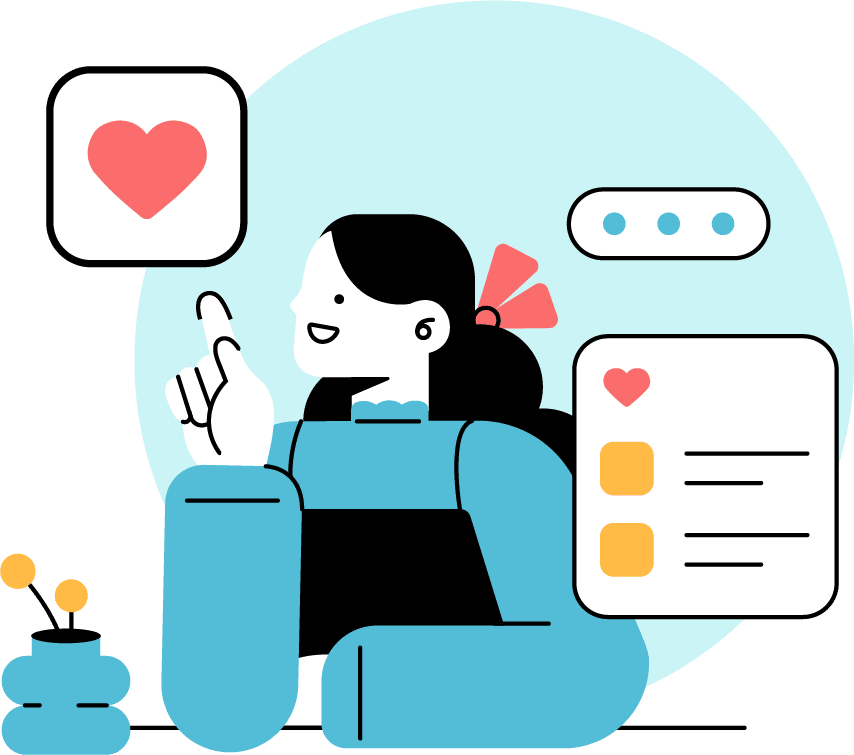Is Virtual Therapy as Effective as In Person Therapy?
The internet has proved to be highly efficient at making society’s lives easier in many ways. One of these is providing different avenues of care for people who need medical attention, therapy, or other treatment from their healthcare providers.
For those struggling with a mental health condition, or for those who may just need someone to talk to, online therapy has proven to be revolutionary for the mental health care industry. Mental health professionals and patients in need are both finding comfort and convenience in providing and seeking mental health services from their own homes.
Online therapy has many benefits, and it’s essential to understand what treatment options are available for those who want online therapy service to address their mental health needs rather than in-person sessions.
What is Virtual Therapy?
Virtual therapy has many names, including online mental health, online therapy, online counseling, and many more.
Virtual therapy is any type of therapy session that takes place over the phone, via video conferencing, a mobile app, or a virtual reality device.
The most obvious benefit of virtual therapy sessions is that it allows the patient to receive treatment and care from the comfort of their own home, rather than having to go to a therapist’s office.
Virtual psychotherapy is a common type of mental health support done via telehealth, which treats people with mental health conditions, relationship issues, and severe stress. A licensed therapist provides traditional therapy via phone calls or video chat in this setting.
Although virtual therapy is not a new method of care, it saw a drastic increase during the COVID-19 global pandemic when many people seeking care did not feel safe traveling, using public transportation, or going into an office and risking exposure to the virus.
On the same note, the fear of exposure to COVID-19 and its potential harm triggered a 25% increase in anxiety and depression worldwide in 2020.
More than ever, people who struggle with mental health issues need mental health support options for a safe, productive place to seek treatment and improve their quality of life.
Virtual therapy offers a safe space for many individuals, regardless of their diagnosis, to address their mental health needs and access their licensed therapist as necessary.
Benefits of Virtual Therapy
The convenience, safety, and accessibility of virtual therapy are some of the main reasons many individuals prefer online therapy sessions to face-to-face therapy. For a person struggling with a mental illness, remote therapy with an online therapist can be life-saving. Here are some of the most significant benefits of using an online therapy platform to seek care.
1. Accessibility
Online therapy provides access to those with physical limitations or in remote areas. This can also include those who can not travel to in-person therapy sessions due to lack of transportation or physical or mental health conditions.
2. Cost savings
For patients who need financial support, online therapy can save money on commuting, public transportation, and having to miss or leave work early.
3. Comfort
For those with social anxieties, using public transportation and sitting in a waiting room can be upsetting or triggering. Online therapy services can provide relief for those with generalized anxiety disorders or social anxiety disorders, who may struggle to share physical spaces with others, but still have mental health needs.
4. Additional privacy
Online therapy offers another layer of privacy for individuals who prefer to keep their therapy sessions private or anonymous. Logging in at home and having private sessions provides the comfort and anonymity that many people prefer.
5. Covered by most health insurance
Most states require insurance companies to cover virtual therapy sessions just as they do traditional therapy. Confirm insurance coverage before pursuing online therapy, so you won’t have to pay steep out-of-pocket costs.
Cons of Virtual Therapy
Virtual therapy may not be suitable for everyone. The cons of online therapy are worth noting if you contemplate it as a mental health treatment method. Here are a few cons of online therapy:
1. Technology Issues
Online therapy relies on an internet connection, and you may encounter issues with connectivity, hardware, and other technical problems. Your therapist should communicate a backup plan if there are issues at the time of your appointment.
2. Security
When any personal information is transmitted online, there is always a risk of data breach and confidentiality. Your provider should offer some peace of mind with their platform’s security and the steps of protection they provide for patients.
3. Some may require a higher level of care
For individuals with severe cases, in-person therapy paired with virtual sessions may be ideal. Face-to-face therapy allows a therapist to read nonverbal cues and body language that they may not be able to observe in an online therapy session.
What Types of Care are Most Effective in a Virtual Environment?
1. Individual Therapy
Individual therapy also called psychotherapy or talk therapy, is a one-on-one session between a patient and a therapist. It’s a collaborative process where the therapist and patient work together to discover the underlying causes of specific thoughts and behaviors and how to make lifestyle changes to correct the problematic ones.
This therapy method is the most common for mental health disorders and can be a very successful treatment option in virtual or in-person sessions.
Traditional in-person therapy and online therapy are both highly effective psychotherapy approaches to treatment.
2. IOP (Intensive Outpatient Program)
IOP is a mental health level of care designed for those who need more support than what a weekly therapy appointment can provide. In a virtual IOP environment, patients typically have group therapy, virtual counseling, mindfulness, and talk therapy, including CBT (cognitive behavioral therapy) several days a week for about 6-10 weeks.
Intensive outpatient care helps individuals receive the care they need without the stress of traveling to a treatment center several times a week.
Like in-person therapy, IOP online care still allows patients to gain peer support, gain coping strategies, attend group therapy sessions, and get individual counseling from a computer or smartphone.
When Is In-Person Therapy Necessary?
Some individuals respond better to in-person therapy and prefer the neutral setting of a therapist’s office. The home or workspace may not be where some people feel safe talking openly and being vulnerable, so their sessions are more productive away from home.
Some mental health treatments require in-person therapy to address specific issues and behaviors. More serious mental health conditions may require in-person sessions to receive care effectively.
Communication may feel limited through a screen, including nonverbal cues and body language assessment. A hybrid treatment model can be implemented in these cases, where patients participate in both in-person therapy sessions and virtual sessions as well.
The temptation to multitask is relevant in virtual therapy for both the patient and the therapist. Emails, text messages, and other distractions can be prevalent issues in a virtual setting and take away from the session’s productivity.
Therapy Platforms vs. Private Therapy
It is important to distinguish the difference between virtual therapy through a preexisting in-person therapy practice and an exclusively online therapy platform. Several large online therapy platforms offer care for individuals seeking treatment who don’t have insurance or the funds to pay the high out-of-pocket costs.
Therapy platform sites like BetterHelp and TalkSpace offer care in family therapy, marriage counseling, individual therapy, and more. The sites employ licensed professionals with the appropriate education, licensing, training, and practice required within the field.
For some people, seeking treatment from a platform may be effective and a great experience. However, it’s important to note that some mental health professionals offering their services on certain telehealth platforms do so to earn supplemental income.
This means the clients they treat from these sites are part of their second job, so there might be a different level of attention provided that you would otherwise get from a private therapy appointment. Some online therapists from these sites see an enormous number of patients and may not have the time to give each client the attention they might need.
Is virtual therapy as effective as in person therapy?
Online therapy is proving to be just as effective as in-person therapy, and retention rates are also higher. Virtual therapy’s convenience, affordability, and accessibility seem to be the most influential factors for patients who opt to receive care online.
Clear Behavioral Health – Virtual IOP is an online, mental health intensive outpatient program from Clear Behavioral Health that’s open to any California resident. We are skilled at treating individuals who are struggling with burnout, depression, anxiety, trauma, and grief, and who are also constrained by barriers and schedules preventing them from accessing in-person therapy and mental health services.
Our virtual mental health program grants all Californians remote access to mental health treatment when they need it.





